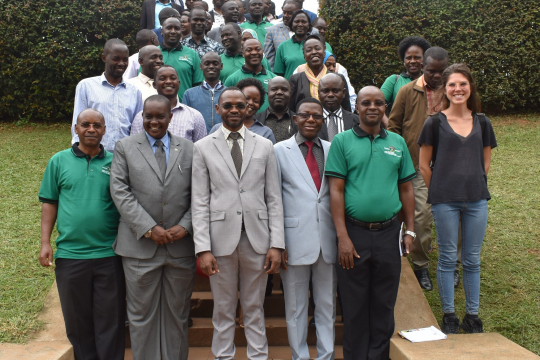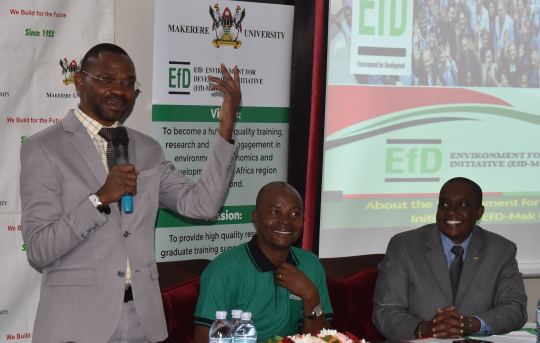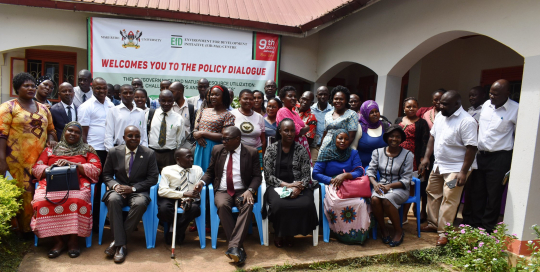About the Environment for Development Initiative- Makerere (EfD-Mak Center Uganda)
The EfD-Mak is a new Center at Makerere University established in Hanoi, Vietnam in 2018, under the Environment for Development Initiative (EfD), a global network of environmental economics research centers.
EfD contributes to effective management of the environment in the global South through applied research, institutional development, academic training and policy interaction. EfD has 15 centers across the world, in Chile, China, Colombia, Costa Rica, Ethiopia, Ghana, India, Kenya, Nigeria, Sweden, South Africa, Tanzania, Uganda, USA and Vietnam. The network is coordinated by the EfD Secretariat, a special Unit at the School of Business, Economics and Law, University of Gothenburg, Sweden. The Swedish International Development Cooperation Agency (Sida) is sponsoring the Environment for Development Initiative.
EfD-Mak Center is managed by two colleges - College of Business and Management Sciences (CoBAMS) and the College of Agricultural and Environmental Sciences (CAES). The Center started its full operation in the Financial year 2019-2020 with support from the Swedish International Development Cooperation Agency (Sida). Makerere University launched the EfD-Mak Center on 29th August 2019, becoming the first of its kind in the country.
Vision
The Center’s vision is to become a hub for quality training, research and policy engagement in environmental economics and development in the Africa region and beyond.
Mission
The Center’s mission is to provide high quality policy-relevant research, graduate training support, policy engagement and outreach in the realm of environment and development economics in order to enhance sound environmental management and natural resource utilization for sustainable development.
Leadership of the Center
The Center is headed by Prof. Edward Bbaale from the School of Economics in CoBAMs , deputized by Prof. Johnny Mugisha from the School of Agricultural Sciences in CAES.
The center has established a fully functional office with seven (7) Administrative staff managing its operations.
Core Center Administrative staff
|
No. |
Name |
Institution |
Designation |
Tel. Contact |
|
|
1 |
Edward Bbaale |
Makerere University |
Director |
+256783573395 |
|
|
2 |
Johnny Mugisha |
Makerere University |
Deputy Director |
+256 773155702 |
|
|
3 |
Fred Kasalirwe |
Makerere University |
Data Manager
|
+256774826816 |
|
|
4 |
Hilda Makune |
Makerere University |
Administrative Officer
|
+25677654418 |
|
|
5 |
Anyango Jane |
Makerere University |
Communication Officer
|
+256784738521 |
|
|
6 |
Peter Byabenda |
Makerere University |
IGE Engagement Specialist |
+256773432413 |
Pbabyenda gmail.com |
|
7 |
Ssewankambo Gyaviira |
Makerere university |
Project Manager |
+256786146825 |
Our stakeholders
The EfD-Mak Center works with relevant government departments, the private sector, development partners and civil society to drive research and policy action that are underpinned by issues regarding environmental management and sustainable development.
The Center’s teaching, research, technical support and policy engagement targets the development of skills in priority areas including climate change, energy, food, forests, water, fisheries, agriculture and sustainable development.
Project Activities
The project objectives and results are achieved through a number of activities including:
- Enrolling Junior and Senior Research Fellows and conducting training and research in environmental economics;
- Establishing local and international research and policy networks with collaborating research institutions and policy makers in Government Ministries, Departments and Agencies;
- Monitoring and evaluating the performance of the individual researchers;
- Organizing international conferences, seminar series and meetings for Senior and Junior Research Fellows, academics, researchers and policy makers;
- Training researchers and staff in rigorous environmental policy analysis/ frontier methodological approaches to environmental questions;
- Holding high-level policy dialogues with policy makers, private sector actors, non-government organizations, academia and civil society organizations to exchange ideas and debate on the status, impact and direction of environmental policy in the country;
- Developing policy briefs out of every technical research done or policy dialogue in non-technical language, for sharing with relevant policy makers;
- Conducting short course for government officials and parliamentarians to enable them better appreciate environmental economics and hence mainstream environmental policy in their daily work;
- Organizing policy tours, policy research workshop and fieldwork in the four regions of the country to bring on board environmental policy makers in government, environmental activists in the private sector and civil society organizations followed by a policy-research workshop;
- Conducting policy-research review dialogues and fieldwork in different government Ministries, Departments and Agencies as well as private sector and civil society organizations to identify the policy gaps that need to be closed through empirical research and to bridge the gap between research and policy;
- Publicizing EfD activities in both print, electronic and non-conventional media.
Research Fellows
The EfD-Mak Center has lived to its mandate by enrolling 25 Research fellows (13 Senior Research fellows, 9 Research fellows and 1 Junior Research fellow).
To oversee its activities the center, a nine member Advisory Board from government and non- governmental institutions was inaugurated on 14th April, 2022.
EfD-Mak Advisory Board Members
|
No. |
Name |
Institution |
Designation |
Tel. Contact |
|
|
1 |
Umar Kakumba |
Makerere University. |
Chairperson and Deputy Vice Chancellor (Academic Affairs) |
+256782881355 |
|
|
2 |
Nsereko Mike |
National Environment Management Authority (NEMA) |
Director, Policy, Planning and Information |
+256 772979824 |
|
|
3 |
Onesmus Mugyenyi |
ACODE |
Deputy Executive Director |
+256 772423449 |
|
|
4 |
Ronald Kaggwa |
National Planning Authority (NPA) |
Manager, Production, Trade and Tourism |
+256 772461828 |
|
|
5 |
Mukasa Tom Bukenya |
Ministry of Agriculture, Animal Industry & Fisheries |
Ag. Director, Fisheries |
+2567782059294 |
|
|
6 |
Mugabi Stephen David |
Ministry of Water and Environment (MWE) |
Ag. Director, Environmental Affairs |
+256772476148 |
|
|
7 |
Sam Mugume Kojo |
Ministry of Finance Planning & Economic Development |
Ag. Director & Commissioner |
+256 772529023 |
|
|
8 |
Rebecca Ssabaganzi |
Wakiso District Local Government |
Natural Resources Officer and Representative of Local Governments |
+256772465657 |
|
|
9 |
Eria Hisali |
Makerere University |
Principal, College of Business and Management Sciences |
+256772418739 |


